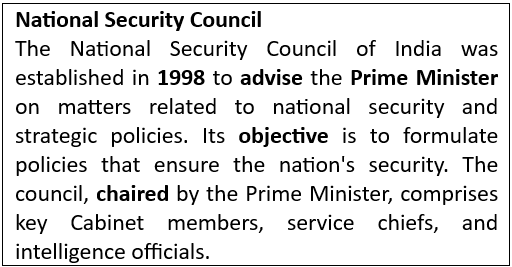- Courses
- GS Full Course 1 Year
- GS Full Course 2 Year
- GS Full Course 3 Year
- GS Full Course Till Selection
- Answer Alpha: Mains 2025 Mentorship
- MEP (Mains Enrichment Programme) Data, Facts
- Essay Target – 150+ Marks
- Online Program
- GS Recorded Course
- Polity
- Geography
- Economy
- Ancient, Medieval and Art & Culture AMAC
- Modern India, Post Independence & World History
- Environment
- Governance
- Science & Technology
- International Relations and Internal Security
- Disaster Management
- Ethics
- NCERT Current Affairs
- Indian Society and Social Issue
- NCERT- Science and Technology
- NCERT - Geography
- NCERT - Ancient History
- NCERT- World History
- NCERT Modern History
- CSAT
- 5 LAYERED ARJUNA Mentorship
- Public Administration Optional
- ABOUT US
- OUR TOPPERS
- TEST SERIES
- FREE STUDY MATERIAL
- VIDEOS
- CONTACT US
National Security Strategy
National Security Strategy
Context
Recently, India has initiated the implementation of a National Security Strategy (NSS). This makes it First of its kind occasion.
What is National Security Strategy?
|
1.Definition |
NSS is a comprehensive plan outlining a country's approach to safeguarding its citizens, resources, and interests from external and internal threats. |
|
2.Scope |
It encompasses military, economic, diplomatic, and intelligence measures, ensuring a coordinated and proactive response to evolving security challenges. |
|
3.Risk Assessment |
NSS involves a thorough analysis of potential threats, vulnerabilities, and opportunities, guiding policies and resource allocation to mitigate risks effectively. |
|
4.Adaptability |
A dynamic document, the strategy evolves to address emerging threats, technological advancements, and geopolitical changes, providing a framework for long-term national security planning. |
Countries with well-established NSS
- In advanced nations with well-established military and
 security frameworks, the implementation of a NSS is commonplace and subject to periodic updates.
security frameworks, the implementation of a NSS is commonplace and subject to periodic updates. - Noteworthy examples include the publication of national security strategies by the United States, the United Kingdom, and Russia.
- China, with its governance structure interlinked, has formulated the Comprehensive National Security as a pivotal part of its strategic framework.
- Similarly, Pakistan has recently unveiled the National Security Policy 2022-2026, emphasizing its core national security goals and focus areas.
Challenges |
What needs to be done? |
|
1.Dynamic Threat Landscape: Adapting to rapidly evolving threats poses a challenge, demanding continuous assessment and adjustment of national security strategies. |
1.Strengthen Intelligence to deter threat: Enhance intelligence capabilities to detect threats, assess risks, and inform strategic decisions crucial for national security. |
|
2.Cybersecurity Vulnerabilities: Persistent cyber threats require constant innovation to safeguard critical infrastructure and sensitive information. |
2.Invest in Technology: Prioritize research and development, integrating cutting-edge technologies to fortify cyber defenses, surveillance capabilities, and military readiness. |
|
3.International Cooperation: Coordinating strategies with global partners is challenging, requiring diplomacy and collaboration to address transnational security threats effectively. |
3.Collaborate Internationally: Foster international partnerships for intelligence-sharing, technology collaboration, and joint efforts to address global security challenges effectively. |
|
4.Resource Allocation: Balancing finite resources while addressing multifaceted security challenges demands strategic prioritization and efficient allocation to ensure comprehensive protection. |
4.Optimum Resource utilisation: Increase public understanding and support by transparently communicating the strategy, promoting civic engagement, and allocate finances in budget. |
Conclusion
A robust NSSis imperative for India, ensuring comprehensive defense, strategic foresight, and agility to counter evolving threats and safeguard national interests effectively.



